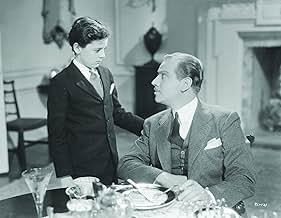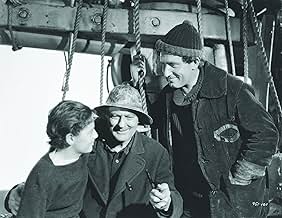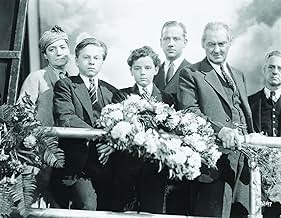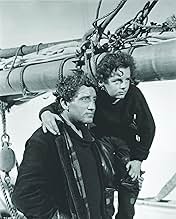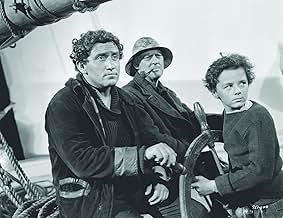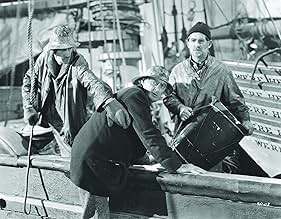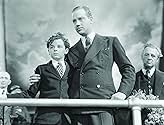NOTE IMDb
7,9/10
12 k
MA NOTE
Un gosse gâté tombé par-dessus bord d'un bateau à vapeur est recueilli par un bateau de pêche, où il est obligé de gagner son pain en prenant place dans l'équipage.Un gosse gâté tombé par-dessus bord d'un bateau à vapeur est recueilli par un bateau de pêche, où il est obligé de gagner son pain en prenant place dans l'équipage.Un gosse gâté tombé par-dessus bord d'un bateau à vapeur est recueilli par un bateau de pêche, où il est obligé de gagner son pain en prenant place dans l'équipage.
- Réalisation
- Scénario
- Casting principal
- Récompensé par 1 Oscar
- 8 victoires et 6 nominations au total
Jack La Rue
- Priest
- (as Jack LaRue)
Sam McDaniel
- 'Doc'
- (as Sam McDaniels)
Bill Burrud
- Charles
- (as Billy Burrud)
Norman Ainsley
- Robbins
- (non crédité)
Wally Albright
- Boy
- (non crédité)
Betty Alden
- Bit Role
- (non crédité)
C.E. Anderson
- Fisherman
- (non crédité)
William Arnold
- Reporter
- (non crédité)
Avis à la une
10Beaurega
I saw this for the first time, just last night, on American Movie Classics. After watching the film, I couldn't help but wonder where it's been all my life. What a beautiful film! Robert Osborne made a few opening remarks to the film, as he usually does on this channel. I didn't know that Spencer Tracy won his first Oscar for this film, but it was certainly well deserved. His portrayal of Manuel is really pivotal to the success of the film, I think. I'm not too sure about his accent, but it wasn't really distracting or anything. If you haven't seen this, watch it! You won't be disappointed -- especially if you enjoy pictures where ships and the sea are the setting for the action.
A spoiled rich boy falls overboard & emerges from the sea into the world of the CAPTAINS COURAGEOUS, the rough & honest fishermen who ply the waters of the North Atlantic for months on end.
Rudyard Kipling's classic novel of maturation & responsibility has been expanded & updated and turned into a wonderful film by MGM. The production values, especially those dealing with the fishing boat sequences, are exceptional.
After the first half hour, where we are introduced to the boy's bad behavior at home, school, father's office & aboard the luxury liner, the film arrives at the heart of the matter with the introduction of the fisherman and their rough, dangerous way of life.
Freddie Bartholomew, luminous face & shining eyes aglow, is the very picture of boyish innocence. The fact that MGM gave him top billing over the powerhouse cast shows the kind of confidence they had in their child star. Although his proper English accent is a bit out of place and his sweetness makes his initial bratty behavior a bit of a stretch, once he's firmly ensconced on the trawler and his life lessons are being learned, it is difficult to think of any other young actor of his era in the role.
His lessons come mainly from Spencer Tracy, who is beyond praise as Manuel, the stalwart Portuguese fisherman. Noble, earthy, lighthearted, honest, these were attributes Tracy could sink his teeth into & he delivers a performance of heroic proportions. Good-natured & loyal, singing joyously to his hurdy-gurdy, his Manuel is still fiercely protective of his `liddle fish,' seeing at once the qualities the boy has to offer, once he shapes up. Audiences surrender to Tracy completely (fake accent and all) and his scenes with young Bartholomew are especially tender. The subsequent Best Actor Oscar for his performance here was very well deserved.
Lionel Barrymore, as the crusty, wise old captain of the fishing boat, is a delight. In one of the last roles in which he had the use of his legs, he is completely believable as a Massachusetts seaman. Like Tracy, he inhabits his part, giving an over-the-top performance that is completely appropriate. He embodies the kind of man anyone would feel confident to have at the helm during a sea storm.
The excellence of the cast is evidenced by having Charley Grapewin, John Carradine & Mickey Rooney all on board as crew members; each is given a chance to display their talents, as is Melvyn Douglas as Bartholomew's preoccupied father.
Movie mavens will recognize Billy Gilbert as a soda fountain jerk, as well as Christian Rub & Jimmy Conlin as fisherman, all uncredited.
Rudyard Kipling's classic novel of maturation & responsibility has been expanded & updated and turned into a wonderful film by MGM. The production values, especially those dealing with the fishing boat sequences, are exceptional.
After the first half hour, where we are introduced to the boy's bad behavior at home, school, father's office & aboard the luxury liner, the film arrives at the heart of the matter with the introduction of the fisherman and their rough, dangerous way of life.
Freddie Bartholomew, luminous face & shining eyes aglow, is the very picture of boyish innocence. The fact that MGM gave him top billing over the powerhouse cast shows the kind of confidence they had in their child star. Although his proper English accent is a bit out of place and his sweetness makes his initial bratty behavior a bit of a stretch, once he's firmly ensconced on the trawler and his life lessons are being learned, it is difficult to think of any other young actor of his era in the role.
His lessons come mainly from Spencer Tracy, who is beyond praise as Manuel, the stalwart Portuguese fisherman. Noble, earthy, lighthearted, honest, these were attributes Tracy could sink his teeth into & he delivers a performance of heroic proportions. Good-natured & loyal, singing joyously to his hurdy-gurdy, his Manuel is still fiercely protective of his `liddle fish,' seeing at once the qualities the boy has to offer, once he shapes up. Audiences surrender to Tracy completely (fake accent and all) and his scenes with young Bartholomew are especially tender. The subsequent Best Actor Oscar for his performance here was very well deserved.
Lionel Barrymore, as the crusty, wise old captain of the fishing boat, is a delight. In one of the last roles in which he had the use of his legs, he is completely believable as a Massachusetts seaman. Like Tracy, he inhabits his part, giving an over-the-top performance that is completely appropriate. He embodies the kind of man anyone would feel confident to have at the helm during a sea storm.
The excellence of the cast is evidenced by having Charley Grapewin, John Carradine & Mickey Rooney all on board as crew members; each is given a chance to display their talents, as is Melvyn Douglas as Bartholomew's preoccupied father.
Movie mavens will recognize Billy Gilbert as a soda fountain jerk, as well as Christian Rub & Jimmy Conlin as fisherman, all uncredited.
A movie like this could only have been made in the early days of cinema. Before the days when fancy camera angles, careful editing, and computer-effects combine to make any pretty-boy a big star, movies had to rely on genuine talent on the part of child actors.
Nowhere is this more evident than with Freddie Bartholomew. The character he plays is a spoiled rich-kid, used to getting his own way and obnoxious with everyone he meets. Yet he plays the role in such a way that we can sympathize with him, rather than detest him. We understand the character, but we do not hate him.
Watch any similar movie made today, and the child actors will whine and sneer and have smart-mouthed replies to everything. In this movie, however, the character is not taken to that extreme, and when he makes his transition in the film we are able to love him, and are able to forget how horrid he was before.
The boy can truly act. When he cries for his loved ones, we cry with him. When he is happy, we are able to smile. And when he does something foolish, we do not get the urge to punch him in the face. The character is attractive by the end of the film, and that is a quality which few (if any) child actors possess today.
If you want to see a touching movie with superb acting and genuine emotion, this is the one.
Nowhere is this more evident than with Freddie Bartholomew. The character he plays is a spoiled rich-kid, used to getting his own way and obnoxious with everyone he meets. Yet he plays the role in such a way that we can sympathize with him, rather than detest him. We understand the character, but we do not hate him.
Watch any similar movie made today, and the child actors will whine and sneer and have smart-mouthed replies to everything. In this movie, however, the character is not taken to that extreme, and when he makes his transition in the film we are able to love him, and are able to forget how horrid he was before.
The boy can truly act. When he cries for his loved ones, we cry with him. When he is happy, we are able to smile. And when he does something foolish, we do not get the urge to punch him in the face. The character is attractive by the end of the film, and that is a quality which few (if any) child actors possess today.
If you want to see a touching movie with superb acting and genuine emotion, this is the one.
Harvey Cheyne (Freddie Bartholomew) is a spoiled brat used to having his own way. When a prank goes wrong on board an ocean liner Harvey ends up overboard and nearly drowns. Fortunately he's picked up by a fishing boat just heading out for the season. He tries to bribe the crew into returning early to collect a reward but none of them believe him. Stranded on the boat he must adapt to the ways of the fishermen and learn more about the real world.
Frank S. Nugent of The New York Times called the film "another of those grand jobs of movie-making we have come to expect of Hollywood's most prodigal studio. With its rich production, magnificent marine photography, admirable direction and performances, the film brings vividly to life every page of Kipling's novel and even adds an exciting chapter or two of its own." This really is a great film. I went in knowing nothing about it, and came out really impressed. For the first quarter or so of the film, I was increasingly annoyed with the spoiled boy, and did not now where things were going to go. But once it shifted gears, that build-up of annoyance paid off. In fact, it would not have been nearly as effective if they didn't convince me of how awful this boy was. Perfect execution.
Frank S. Nugent of The New York Times called the film "another of those grand jobs of movie-making we have come to expect of Hollywood's most prodigal studio. With its rich production, magnificent marine photography, admirable direction and performances, the film brings vividly to life every page of Kipling's novel and even adds an exciting chapter or two of its own." This really is a great film. I went in knowing nothing about it, and came out really impressed. For the first quarter or so of the film, I was increasingly annoyed with the spoiled boy, and did not now where things were going to go. But once it shifted gears, that build-up of annoyance paid off. In fact, it would not have been nearly as effective if they didn't convince me of how awful this boy was. Perfect execution.
Captains Courageous (1937)
You might think this movie will come off as old-fashioned and stale, a old Kipling yarn filmed in the 1930s in black and white. Well don't pre-judge this! It's really good. Fast, energetic, touching, and filled with good acting and great filming. It even has a moral tale that doesn't smack you as sentimental, but is a good reminder of what counts in life.
The main character is a rich boy who obviously needs to learn some lessons in humility and honor. And he's played with real perfection by the young English actor Freddie Bartholomew who had a five year heyday of great roles and great performances with classic adventure stories told on film. And there are parallels here of bigger tales like "Kidnapped" (1938) and "David Copperfield" (1935), with a child intersecting the world of adults and its perils.
His adult friend is the bigger star, Spencer Tracy, who does a good job though I've never quite loved his style of acting. Here he plays a Portuguese sailor with a half an accent and it's the one problem in the film. Next to him in a big role is Lionel Barrymore, who recognizably makes for a quirky captain of the fishing boat. He's great. And so are the other side characters, including a whole slew of big names from the time (John Carradine and Mickey Rooney are probably most famous now).
Much of the film is a low key adventure film. It's aimed at kids the way "The Wizard of Oz" is aimed at kids—meaning it's great for adults, too, and there are a few things snuck in to keep older viewers attuned. Director Victor Fleming went on to direct "Oz" and much of "Gone with the Wind" in two years, and you can feel his Hollywood expertise in every scene here. This is not a stiff 1930s movie if your head is in that mode. Fleming (with photographer great Harold Rosson, who shot "Oz" and a hundred others) makes it vivid and wondrous. The mix of studio shots and authentic sea footage (made with a second film crew in the North Atlantic) is brilliantly handled—no back projection goofs here.
I really liked this movie. It's straight up filmic storytelling. No distractions, no bumbling. Give it a go and be surprised.
You might think this movie will come off as old-fashioned and stale, a old Kipling yarn filmed in the 1930s in black and white. Well don't pre-judge this! It's really good. Fast, energetic, touching, and filled with good acting and great filming. It even has a moral tale that doesn't smack you as sentimental, but is a good reminder of what counts in life.
The main character is a rich boy who obviously needs to learn some lessons in humility and honor. And he's played with real perfection by the young English actor Freddie Bartholomew who had a five year heyday of great roles and great performances with classic adventure stories told on film. And there are parallels here of bigger tales like "Kidnapped" (1938) and "David Copperfield" (1935), with a child intersecting the world of adults and its perils.
His adult friend is the bigger star, Spencer Tracy, who does a good job though I've never quite loved his style of acting. Here he plays a Portuguese sailor with a half an accent and it's the one problem in the film. Next to him in a big role is Lionel Barrymore, who recognizably makes for a quirky captain of the fishing boat. He's great. And so are the other side characters, including a whole slew of big names from the time (John Carradine and Mickey Rooney are probably most famous now).
Much of the film is a low key adventure film. It's aimed at kids the way "The Wizard of Oz" is aimed at kids—meaning it's great for adults, too, and there are a few things snuck in to keep older viewers attuned. Director Victor Fleming went on to direct "Oz" and much of "Gone with the Wind" in two years, and you can feel his Hollywood expertise in every scene here. This is not a stiff 1930s movie if your head is in that mode. Fleming (with photographer great Harold Rosson, who shot "Oz" and a hundred others) makes it vivid and wondrous. The mix of studio shots and authentic sea footage (made with a second film crew in the North Atlantic) is brilliantly handled—no back projection goofs here.
I really liked this movie. It's straight up filmic storytelling. No distractions, no bumbling. Give it a go and be surprised.
Le saviez-vous
- AnecdotesWhen production finally wrapped in late February 1937, Spencer Tracy was relieved. "Well, I got away with it," he said later. "Want to know why? Because of Freddie, because of that kid's performance, because he sold it 98 per cent. The kid had to believe in Manuel, or Manuel wasn't worth a quarter. The way he would look at me, believe every word I said, made me believe in it myself. I've never said this before, and I'll never say it again. Freddie Bartholomew's acting is so fine and so simple and so true that it's way over people's heads. It'll only be by thinking back two or three years from now that they'll realize how great it was."
- GaffesIt does not make sense that Harvey's teachers could expect him to be independent if he is only ten. In the novel he was fifteen.
- Citations
Harvey: I bet I know a lot of things you don't know. I know that's not French you're singing.
Manuel Fidello: That's right. About ten million people know it Portuguese.
Harvey: I bet you can't speak French.
Manuel Fidello: Right now, I sorry I speak *English*.
- Crédits fousThe opening credits are letters on planks, like the lettering on the side of ships, and between screen-fulls, a foaming wave of water splashes over it and then runs off. In the initial sets of credits, these appear to be actually letter-forms attached to the wood, as the water gets deflected by some of the letters; in later sets of credits, this effect is harder to see and the sets may be credits superimposed upon wood.
- ConnexionsEdited into Spisok korabley (2008)
- Bandes originalesOoh What a Terrible Man
(1937) (uncredited)
Lyrics by Gus Kahn
Music by Franz Waxman
Sung by John C arradine, Spencer Tracy, Freddie Bartholomew, and other seaman
Meilleurs choix
Connectez-vous pour évaluer et suivre la liste de favoris afin de recevoir des recommandations personnalisées
- How long is Captains Courageous?Alimenté par Alexa
Détails
Box-office
- Budget
- 1 645 000 $US (estimé)
- Durée1 heure 57 minutes
- Couleur
- Rapport de forme
- 1.37 : 1
Contribuer à cette page
Suggérer une modification ou ajouter du contenu manquant


